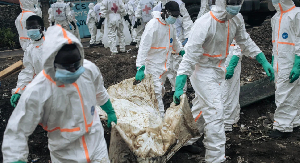Professor Kwabena Frimpong-Boateng, Minister of Environment, Science, Technology and Innovation, has endorsed the draft National Policy for Aflatoxin Control on Food and Feed, calling for more education to be done on aflatoxins among the populace.
He said because of the danger they posed to human and animal health, there was the need for intensive education and awareness creation to alert people to adopt safer pre-harvest and post-harvest practices to keep food and feed safety.
Aflatoxins are harmful toxins produced by certain species of fungi or molds, which grow naturally on foods, affecting food products either on the farm or during storage and handling under certain favourable conditions such as high temperature, high moisture, delayed harvesting, long periods of droughts and the presence of pest.
Aflatoxin contamination is said to be highly prevalent in Ghana and mostly affects staple foods such as raw and processed maize products, groundnuts, sorghum, millet, kokonte (Partially fermented cassava), some species, and animal products such as meat, milk, fish and eggs.
Aflatoxin is also said to be a potent cancer-causing agent, known to cause about 30 per cent of liver cancer in humans and impairing liver function.
Also, aflatoxins could cause weight loss, various health conditions, and death in livestock and cultured fish fed with contaminated feed, while poultry birds fed with aflatoxin-contaminated feed often lay 70 per cent fewer eggs.
Prof Frimpong-Boateng, at a high level consultations and policy engagement on the Aflatoxin Policy in Accra, said ensuring the health of a people was important for every country and so it was welcoming that such a policy was developed to safeguard the health of the people.
Dr (Mrs) Rose Omari, Senior Research Scientist, Science and Technology Policy Research Institute of the Council for Scientific and Industrial Research, (CSIR-STEPRI), who led a team of the National Steering Committee for Aflatoxin Control (NSCAC) to the Environment Ministry, said the vision of the policy was to improve harmonization and coordination of activities among all stakeholders for effective management and control of aflatoxins in food and feed.
She said the policy, put together by the members of the NCAC and other relevant stakeholders after extensive consultation among various actors, aimed at protecting human and animal health and to increase the income of food value chain actors by reducing aflatoxin contamination in food and feed.
She said in Ghana, aflatoxin contamination accounts for losses of about 319,000 tonnes or 18 per cent of the country’s annual maize production, posing a threat to farmers and consumers alike and affecting exportation of maize to the international market.
Dr Omari explained that in recognizing the detrimental effect of aflatoxins, the African Union established the Partnership for Aflatoxin Control in Africa (PACA) in 2011 to help address the problem in countries, while elaborating a 10-year strategy from 2013 to 2022 to guide actions of member states, especially ECOWAS.
PACA, she said, was currently supporting six pilot countries namely Nigeria, the Gambia, Malawi, Senegal, Tanzania and Uganda to develop systems for control of aflatoxins.
The rest of the countries including; Ghana, had been tasked to also develop actions for aflatoxin control, looking at the situational analysis of the extent of aflatoxins problem in the country, develop a national action plan for Aflatoxin control and mobilize resources for the implementation of prioritized actions in the action plan.
The policy has been presented to the Ministry of Environment, Science, Technology, and Innovation, as part of the final consultation process before it is passed by cabinet as a national document.
General News of Monday, 29 June 2020
Source: www.gna.org.gh

















